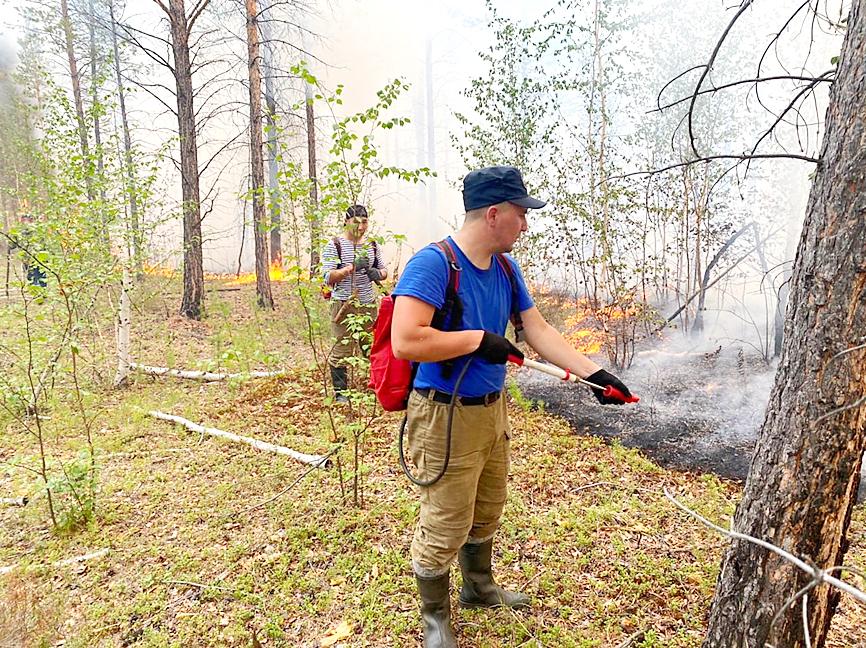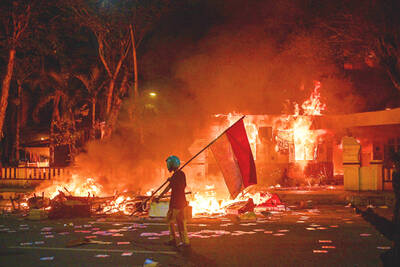The Russian army on Tuesday sent firefighting planes to battle huge wildfires that have blanketed Siberian towns in thick smoke, as residents in a region known for its frozen tundra complain of being suffocated by a sweltering heat wave.
With flames tearing across about 800,000 hectares of Russian forest, the hardest-hit northern region of Yakutia has been in a state of emergency for weeks, as climate scientists sound the alarm about the potential long-term effects.
Last week, fires in Russia’s central Chelyabinsk region killed one man and destroyed dozens of village homes.

Photo: Russian Ministry of Emergency Situations/handout via Reuters
“We’re suffocating. Our lungs are being poisoned by acrid smoke,” reads one of two online petitions by Yakutia’s residents addressed to Russian President Vladimir Putin.
The residents are asking for more equipment and personnel to combat the fires.
Russia has seen its annual fire season become more ferocious in the past few years, as climate change has driven unusually high temperatures across the northern Siberian tundra.
This year, temperatures have hit new record highs.
“The fire risk has seriously flared up across practically the entire country because of the abnormal heat wave,” Russian Minister of Defense Sergei Shoigu told a meeting on Tuesday. “The most difficult situation is in Yakutia.”
On Tuesday, more than 2,600 firefighters were battling blazes in Yakutia, which has borne the brunt of huge forest fires over the past few years.
Putin ordered the Ministry of Defense to assist local authorities, while the army deployed several water-dropping Ilyushin Il-76 aircraft to douse the flames from the sky, Shoigu said, without specifying how many aircraft were sent.
The Siberian fires have raised fears about the permafrost and peatland thawing, releasing carbon long stored in the frozen tundra.
Meanwhile, ash from the fires could blanket nearby snow cover, turning it dark so that it absorbs more solar radiation and warms even faster.
In 2019 and last year, Yakutia’s wildfires led to record amounts of greenhouse gases being released from the region, said the Copernicus Atmosphere Monitoring Service (CAMS), which is part of an EU observation program.
In just the past six weeks, fires in the region have spewed out about 150 megatonnes of carbon dioxide equivalent — close to the 2017 annual fossil-fuel emissions of Venezuela, CAMS senior scientist Mark Parrington said.
“We’re still piecing together the information to try and understand what it means for the climate,” he said.
“This year, we haven’t yet seen so many fires within the Arctic Circle within that region, but just within the last three to four days we’ve started to see a number of hotspots occurring and a lot of smoke,” Parrington said.
While fires rage through forests, the country has struggled under a heat wave that has broken several temperature records in western Russia.
Moscow roasted at 33.1°C, its hottest June 13 in 85 years.
In Siberia, the city of Yakutsk hit 35°C at one point. The region’s city of Verkhoyansk — seen as one of the coldest places on Earth — saw temperatures of more than 30°C, the state weather forecast agency said.
“The temperature is really high, eight to 10 degrees higher than the norm,” the agency added.

Australia has announced an agreement with the tiny Pacific nation Nauru enabling it to send hundreds of immigrants to the barren island. The deal affects more than 220 immigrants in Australia, including some convicted of serious crimes. Australian Minister of Home Affairs Tony Burke signed the memorandum of understanding on a visit to Nauru, the government said in a statement on Friday. “It contains undertakings for the proper treatment and long-term residence of people who have no legal right to stay in Australia, to be received in Nauru,” it said. “Australia will provide funding to underpin this arrangement and support Nauru’s long-term economic

ANGER: Unrest worsened after a taxi driver was killed by a police vehicle on Thursday, as protesters set alight government buildings across the nation Protests worsened overnight across major cities of Indonesia, far beyond the capital, Jakarta, as demonstrators defied Indonesian President Prabowo Subianto’s call for calm. The most serious unrest was seen in the eastern city of Makassar, while protests also unfolded in Bandung, Surabaya, Solo and Yogyakarta. By yesterday morning, crowds had dispersed in Jakarta. Troops patrolled the streets with tactical vehicles and helped civilians clear trash, although smoke was still rising in various protest sites. Three people died and five were injured in Makassar when protesters set fire to the regional parliament building during a plenary session on Friday evening, according to

‘NEO-NAZIS’: A minister described the rally as ‘spreading hate’ and ‘dividing our communities,’ adding that it had been organized and promoted by far-right groups Thousands of Australians joined anti-immigration rallies across the country yesterday that the center-left government condemned, saying they sought to spread hate and were linked to neo-Nazis. “March for Australia” rallies against immigration were held in Sydney, and other state capitals and regional centers, according to the group’s Web site. “Mass migration has torn at the bonds that held our communities together,” the Web site said. The group posted on X on Saturday that the rallies aimed to do “what the mainstream politicians never have the courage to do: demand an end to mass immigration.” The group also said it was concerned about culture,

CRACKDOWN: The Indonesian president vowed to clamp down on ‘treason and terrorism,’ while acceding to some protest demands to revoke lawmaker benefits Protests in Indonesia over rising living costs and inequality intensified overnight, prompting Indonesian President Prabowo Subianto to cancel a planned trip to China, while demonstrators reportedly targeted the homes of the finance minister and several lawmakers. Rioters entered Indonesian Minister of Finance Sri Mulyani Indrawati’s residence near Jakarta early yesterday, but were repelled by armed forces personnel, Kompas reported. Items were taken from the homes of lawmaker Ahmad Sahroni and two others, according to Detik.com. The reports of looting could not be independently verified, and the finance ministry has not responded to requests for comment. The protests were sparked by outrage over